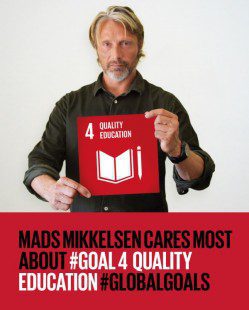The Sustainable Development Goals (SDGs) are a set of 17 ambitious goals for global development, agreed to by 195 nations at the UN in September 2015. They have been described as a diplomatic miracle, the gift of a universal vision for a positive future and they create a common ground for action!
Global Goal number 4
to Ensure inclusive and equitable quality education and promote lifelong learning opportunities for all, includes a number of detailed targets from eliminating gender inequality in access to education, to ensuring that all youth and adults worldwide achieve literacy and numeracy.
Target 4.7 by 2030, all learners acquire the knowledge and skills needed to promote sustainable development, including, among others, through education for sustainable development and sustainable lifestyles, human rights, gender equality, promotion of a culture of peace and non-violence, global citizenship and appreciation of cultural diversity and of culture’s contribution to sustainable development
As one of the country’s major providers of education, training and research for the children’s workforce, with a top 5 ranking in the 2016 People and Planet University League for green universities, the University of Worcester is working to include the SDGs in the practice of our trainee educators and has held its first Institute of Education workshop on the Global Goals. The session enabled cross curricular secondary PGCE student attendees to examine both critical and sympathetic perspectives on the goals themselves, providing an opportunity to explore how they can teach appropriately and engagingly about them and the context of the agenda that they set.
Our guest speaker, Ben Ballin, a specialist in geography and global learning, led the session for trainee teachers from a series of subjects: science, geography, DT, RE and MFL. Attendees were invited to categorise a number of responses to the SDGs, from a diverse range of environments, as well as considering their own stance and indeed personal and professional responsibilities in relation to the goals.
The session provided a chance to work with resources from an EU funded project that Ben and our Senior Lecturer in Teacher Education, Elena Lengthorn, have been involved with: Global learning – Lenses on the world. Elena explains
The booklets focused on Sustainable Development, Poverty & Wealth, alongside Food and Hunger. The resources were developed in partnership with a number of organisations led by TIDE~ global learning and involving one of our partnership secondary schools. All of the resources are freely available and support educators, at all stages, with a tool to teach global development. They introduce the concept of a set of ‘global lenses’ or ‘opticas’, from magnifying glasses (to open the issues) to telescopes (to develop utopian ‘big ideas’ thinking).
Trainees were introduced to a broader global learning picture in light of the proposed PISA assessment on Global Competence that is being introduced in 2018 to measure student skills of analysis and critical thinking, their knowledge and understanding of global issues, along with student attitudes and openness, their respect for cultural otherness and global mindedness.
Students also heard from Elena, an experienced Eco-Schools Ambassador and mentor, on an accessible vehicle for embedding sustainability in their schools, in the form of the Eco-Schools programme.
It is an international award scheme currently running in 49,000 schools across 64 countries. A well-known programme, coordinated by Keep Britain Tidy here in England, that provides a straightforward structure to support schools to ensure that young people have the power to be the change for sustainability that our world needs by engaging them in fun, action-oriented and socially responsible learning.
Our movement, from pessimism towards hope, came in the form of sharing cross curricular ideas on how the SDGs can contribute to teaching and learning within our formal curriculum spaces. Additionally there was recognition of the potential of the Global Goals to support education more comprehensively, through personal development and transferable skills such as critical thinking and problem solving.
Elena Lengthorn
PGCE Secondary Geography Lecturer


We are students at the University of Worcester. We thoroughly enjoyed the session. Especially the interactive aspects as well as learning from our peers. From the session, we understood the importance of SDGs and how they influence society and its members.
Many thanks we learned a lot from your session.
It was my pleasure! You worked together so well!
Elena Lengthorn visited us as a sustainability class for a work shop at the University of Worcester about her efforts to introduce the SDG’s to trainee teachers. After watching the Malala video and listening to the talk on the SDG’s we looked at which of the goals could be applied to our topics of interest. We were surprised how relevant many of the goals were and this session benefited us to open our eyes to how important and interesting these goals are. This would have been very beneficial in secondary school as we never covered anything like this at high school.
Delighted that you see the relevance! Please keep spreading the word about the SDGs!
We were part of the presentation and found it really interesting and insightful. The goals seem reasonable and achievable and was an inspirational session. We used this information to further benefit our knowledge and understanding of sustainability. Thank you!
You are most welcome! It was a pleasure to join your group for the afternoon!
I liked the task where we had the opportunity to add our own ideas how to develope sustainable thinking in schools and how to involve them by making little changes in their lifestyle. The SDG goals were suprising for me, because I wasn’t aware them. It made me more hopeful.
Good to hear that, it was great to get your ideas! Please keep spreading knowledge of the SDGs!
We participated in a work shop in the University of Worcester on the 11th of October that outlined the 17 SDGs, we found that the majority of these goals were realistic and achievable by 2030 and learnt the individual ways that we can advertise the importance of these goals, such as simply spreading the word about the different goals. We also enjoyed the use of vertical learning surfaces and were interested in learning more about the eco-school projects and we would be eager to hear how they have progressed.
Wonderful to hear that you feel the goals are achievable and realistic. You can find out more about the work of Eco-Schools here:
http://www.eco-schools.org.uk/
As University of Worcester students, we received a thoroughly informative workshop based around implementing the SDG’s into curriculum for trainee teachers. We think this was a highly engaging session, where the passion shown by Elena Lengthorn was carried over to me and others and is important when trying to appeal to younger school children.
Thank you for your feedback. I’m pleased you found the session engaging and hope you might find ways to engage with the Global Goals in your studies and future career.
This was an extremely beneficial session that provided me with practical ideas to deliver engaging lessons and activities about the SDGs. It was helpful to take time to reflect on my professional responsibility to the goals. Also, I found out more about Eco-Schools which is something I would consider doing in the future.